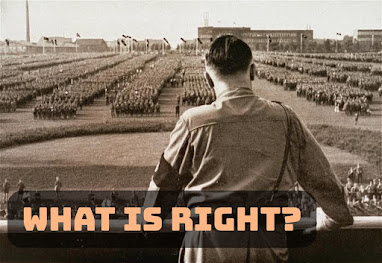Before starting, I have 2 questions for all you readers-
Do you consider Hitler to be a good man?
Would you consider it acceptable if a man cheats to win a game?
I know most of you must be thinking, "what kinda silly questions are those?". I know...I know the answers to those questions may be pretty obvious. Most of you may even have the same answers- "Hitler is definitely a bad guy, and that man is a cheater and should be punished."
So, now let's get to the actual question, is "morality" objective or subjective. let's define what the words morality, objective and subjective really mean. "MORALITY- a belief through which you determine what is right and what is wrong", "OBJECTIVE- anything which is universal in nature and is NOT affected by human perception is objective", "SUBJECTIVE- anything which is based on or influenced by personal feelings or emotions is called subjective". Now that we know what these terms mean, let us try to find some answers.
Philosophers and thinkers for millennia have argued if morality is objective or not, and this question is just not restricted to morality but also to "ART", "BEAUTY", AND "ETHICS". The problem here is that none of us can conclude if these things are objective or subjective.
If you call morality to be subjective then by default you are agreeing to the fact that crimes like murder, rape, sexual abuse, etc... are not objectively wrong. Hitler killing jews was perfectly right and good according to him and the majority of Germans who supported nazis in those times. So, will that make the genocide a good thing? definitely not, right. But the question is how did we come to a conclusion of what is good and what is bad? Many of you may say that we may have collectively agreed that what hurts us or others is bad and what doesn't is good, so, is abortion good or bad- you are technically taking a life but denying it is also taking away a women's right to a healthy life.. you see the problem here is if morality is subjective it would create chaos. But for morality to be objective there must be GOD.
I quote Ravi Zecharia- " When you say there’s too much evil in this world you assume there’s good. When you assume there’s good, you assume there’s such a thing as a moral law on the basis of which to differentiate between good and evil. But if you assume a moral law, you must posit a moral Law Giver, but that’s Who you’re trying to disprove and not prove. Because if there’s no moral Law Giver, there’s no moral law. If there’s no moral law, there’s no good. If there’s no good, there’s no evil." If morality has to be objective it has to be something that is outside of us humans, it should not be affected by our thoughts and beliefs. Even athiest like RICHARD DAWKINS agrees that morality can't be objective without GOD and hence, he had to say that there's no good, bad, right, wrong, or evil. The moment you say there's no evil you are justifying all the crimes as not evil but something the person committing the crime thought was right. This doesn't mean that an athiest cannot live a moral life it just means that an athiest cannot justify objective morality without GOD.
The thing is if we study history and our surroundings properly, we'll understand that objective morality is something that affects all of us. For example- Hitler had to first dehumanize jews through his speeches to make himself and others believe that the genocide was right for the nation, During the Holocaust, Nazis referred to Jews as rats. Similarly, Hutus involved in the Rwanda genocide called Tutsis cockroaches. Slave owners throughout history considered slaves subhuman animals. In Less Than Human, David Livingstone Smith argues that it's important to define and describe dehumanization because it's what opens the door for cruelty and genocide. Here, you can clearly see that this dehumanization helps the oppressor to think that he is doing the right thing, but killing is still morally wrong. The law of morality still remains the same.
CONCLUSION
Morality has to be objective for the systematic function of society, Morality requires us to avoid doing bad things, again, by definition. Hence we all have a moral duty not to harm other living things. This moral duty exists objectively because harm exists objectively. Just as 1 + 1 = 2 is objectively true, so “we should not harm other living things” is objectively true. The only question here is what/who decides "to harm" is bad, it's definitely not us because if it's we who decide it, morality becomes subjective(an individual's perspective) and if morality is subjective then there's morally no crime or evil in this world.
(comment down your thoughts and views in the comment section)


